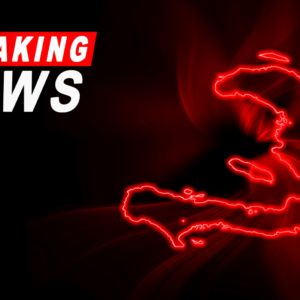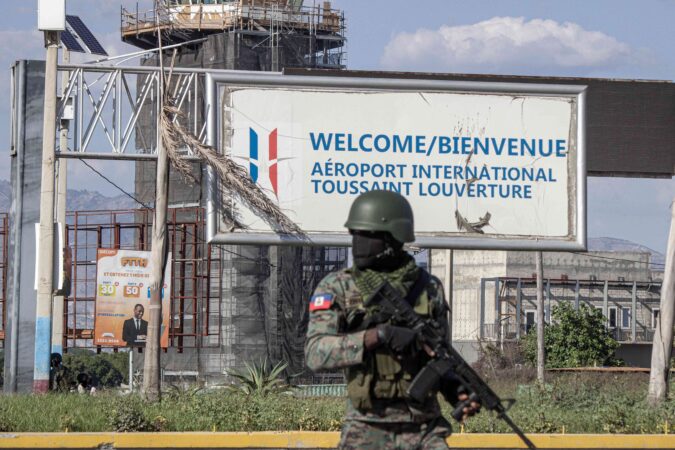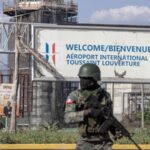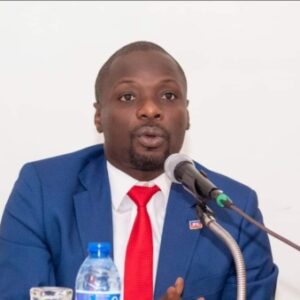Despite recent declarations highlighting the progress made on the political level, Haiti remains on the edge of a precipice with the risk of disastrous contagion effects on the region
The situation in Haiti remains grim despite the formation of a Transitional Presidential Council (TPC), the appointment of a new interim Prime Minister, Garry Conille, a former senior United Nations official, and the expected deployment of the Multinational Mission to security support (MMAS) led by Kenya.
The capital’s international airport reopened to commercial traffic on May 20 after being closed for nearly three months; American airlines have just resumed their flights. Gang activity is endemic in Port-au-Prince, which remains under lockdown.
A soldier of the Armed Forces of Haiti (FADH) guarding the entrance to the airport as a prelude to the rumor concerning the potential return of the then de facto Prime Minister, Ariel Henry. | © Jean Feguens Regala/AyiboPost
The southern regions of the country affected by the 2021 earthquake are inaccessible from the capital due to risks of extortion, kidnappings and gang violence. These also threaten maritime routes, which hampers economic activities.
With nearly 3,300 officers lost over the past three years due to assassinations or resignations, the police force has suffered significant losses.
Read also: Police officers desert the streets of Port-au-Prince
Due to the difficult environment, many Haitians leave the capital and settle in other cities, particularly in the north of the country, including Cap-Haïtien or in the countryside. If thousands of refugees have not left for the coasts of Florida, many have already arrived in neighboring countries such as the Dominican Republic (by land) and Mexico.
Concerns are growing that neither the Transitional Council nor the Multinational Force will succeed in stabilizing the situation and creating an environment conducive to the holding of credible elections, with it being certain that an appropriate contingency plan has been developed. With heavily armed gangs operating in the country, the situation could indeed deteriorate rapidly as gang leaders continue to resist the state and publicly pledge to fight the Multinational Force.
If Port-au-Prince has recently experienced relative calm in terms of security, allowing schools to resume their activities, targeted attacks have taken place against police stations in the capital, notably in Croix-des-Bouquets and Gressier, as well as against civilian prisons such as Titanyen. These incidents suggest that the gangs are ready to confront the Multinational Force.
Read also: Exclusive | Izo builds a wharf waiting for Kenyans
Political dynamics
Through political mediation led by the Caribbean Community (CARICOM), a Transitional Presidential Council was established, albeit with significant delays. The Council is a collegial body exercising specified presidential powers until a new president is elected by 2026. It comprises nine members, seven of whom have voting rights, […].
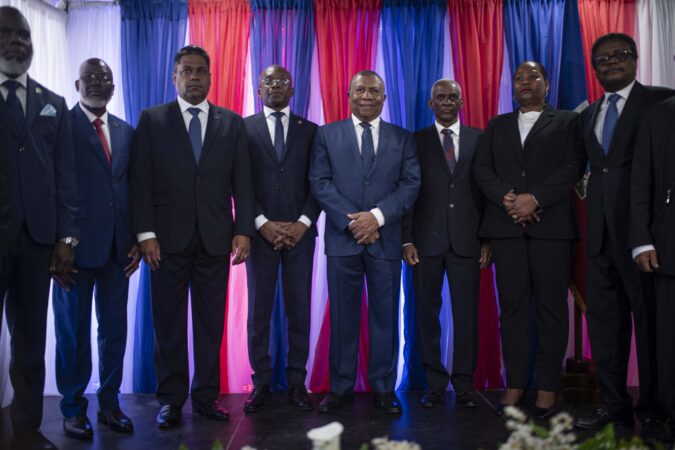
Members of the Presidential Council participate in a photo session during their installation ceremony on April 25, 2024 at the Villa d’Accueil, in Musseau. | © Pedro Anza for AyiboPost
As CARICOM proposes, they represent the main political sectors, including the government of the day and its opposition, civil society organizations, as well as the private sector. Local stakeholders have already criticized its lack of inclusiveness, as it notably does not include representatives of the main religious churches themselves, such as Catholics and Protestants, despite the presence of an interfaith representative.
Although major political and civil society groups are among them, some Haitian experts have noted that Haiti has already attempted seven presidential councils, all of which have failed. The Council is made up of different political forces with divergent interests, which has already given rise to internal conflicts following the appointment, on April 30, of former presidential candidate and Senate President, Edgard Leblanc Fils, as president/ coordinator.
Read also: The selection of a council president and a prime minister divides
Furthermore, an agreement on a rotating presidency is underway, as well as a decision-making process requiring five votes out of seven, which could prove difficult.
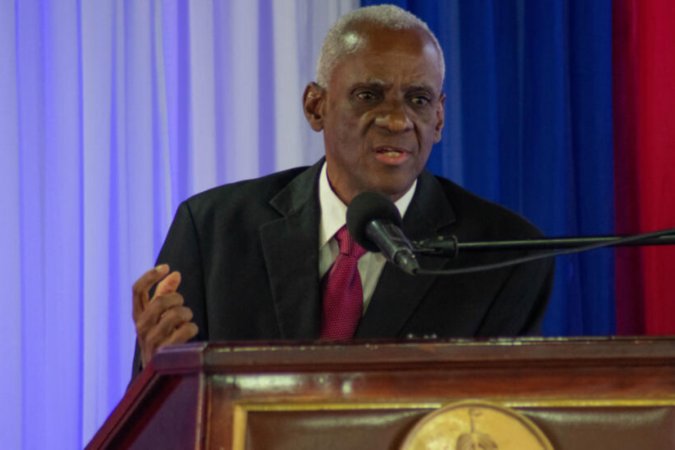
The current president of the Presidential Transitional Council (CPT), Edgard Leblanc Fils, on April 30, 2024, at the Villa d’Accueil, in Musseau. | © Clarens Siffroy/AFP
As part of the negotiations for the formation of a new government, criticism has already been made by the Montana group and the former opposition parties to Henry (called the “30 January coalition”) that political affiliations have precedence over qualifications in the appointment of the Council. Tensions are expected to further intensify over the selection of new heads of key administrations. This situation is similar to past efforts, notably the agreements negotiated by former Prime Minister Ariel Henry on September 11, 2021 and December 21, 2022, which did not result in concrete actions such as constitutional reform and credible elections .
Finally, the Council could face renewed opposition from the gang leader Jimmy Cherizier, also known as “Barbecue”. He also faces potential resistance from Guy Philippe, a retired police officer and politician, as well as the author of a coup d’état in 2004 against then-president Jean-Bertrand Aristide. Subsequently sentenced to federal prison in the United States for money laundering, he attempted to overthrow Ariel Henry last February. The latter both claim that the Council is unconstitutional and imposed from the outside.
What multinational force on the horizon?
The UN Security Council authorized the Multinational Security Support Mission (MMAS) nine months ago, October 3, 2023, for a period of one year. The deployment was temporarily blocked due to the ruling of the Nairobi High Court on January 26, 2024, which declared that the Kenya Police Force could not be deployed without a reciprocal agreement, in accordance with the Kenyan Constitution and the Kenya Defense Forces Act. The Court recalled that Kenya could only deploy defense forces, not security services. In response, the Kenyan government signed a reciprocal agreement with former Prime Minister Henry on March 1, 2024.
Also read: The Haitian file shows a flaw in the Kenyan Constitution
The Kenyan opposition continues to oppose the deployment, as it was previously deemed unconstitutional. They have again filed a suit which will be judged on June 12 and have warned that they are ready to take the case to the Supreme Court of Kenya. If the Kenyan government is willing to respect the legal process, the deployment of its troops could be further delayed until the UN Security Council finally decides to select a new country to lead the mission. In accordance with its resolution 2699, the United Nations Security Council should review the mission within nine months of its authorization. Therefore, the review should normally take place in June.
If the Kenyan government is willing to respect the legal process, the deployment of its troops could be further delayed until the UN Security Council finally decides to select a new country to lead the mission.
Due to the United States’ commitment to providing the necessary support, funding and diplomatic efforts to obtain authorization from the UN Security Council, one of the prerequisites posed by CARICOM for joining the Council transition was to accept the deployment of the Multinational Force.
Yet, all arrangements between Haiti and Kenya concluded by Ariel Henry must be reviewed, including those related to the signed memorandum of understanding, the concept of operations, the use of force (which refers to police operations) and /or the rules of engagement (linked to possible military operations due to the probable presence of military personnel within the Multinational Force). These documents have not been made public; they are not finalized and insufficiently detailed, with Russia – which abstained in the vote in favor of deploying the force – having complained about their lack of clarity during the last meeting of the UN Security Council on Haiti on April 22, 2024. Similar complaints have also been made by Republicans in the US Congress. This review will prove difficult without the establishment of a new functioning government.
In response to the brutal killing of two American missionaries by a gang in Haiti, the United States and Kenya have reaffirmed their intention to quickly deploy a mission. Kenya will take the lead, with the Pentagon providing general guidance. However, the mission is expected to face difficulties in rapidly expanding its operations.
At least 4,000 troops (possibly more due to personnel turnover) will be needed to effectively support national police forces across the country. Currently, Haiti officially has 9,000 officers (around 6,500 according to local human rights advocates) serving every day for a population of 11 million, which is only a third of the size recommended by the UN for a country of this size. Additionally, some of these officers are believed to be involved in criminal gangs, underscoring the need for continued monitoring of national police forces and the potential risks international police will face when working there.
Read also: Gangs hack PNH communications radios
Additionally, the mission is underfunded, with an estimated budget of $600 million over two years. The contributions announced, notably by the United States ($300 million), mainly cover logistics, communication and training, but are insufficient to properly remunerate the police forces that will be deployed. However, the media confirm that the primary motivation of these forces is to make money.
According to the BBC, many Kenyan police officers are reluctant to operate in Haiti due to the gangs’ advanced weaponry, which is more sophisticated than their own. The Bahamas, Bangladesh, Benin, Chad and Jamaica are considering joining the mission, with Benin promising to send 1,500 “seasoned” troops, potentially rising to 2,000. The latter force could be made up entirely of recruits new and insufficiently trained, because Benin needs experienced troops to face security threats from jihadists on its border. The United States is reportedly reluctant to contribute to the salaries of these soldiers due to concerns about their effectiveness. icacity.
Some Latin American countries have the capacity to provide experienced troops for the mission. However, they are not willing to do so because the mission will not be a UN operation, even though it has been authorized by the UN Security Council. The security environment is considered too risky due to the unclear concept of operations. Additionally, the presence of children and adolescents in gangs, the inability to enforce the arms embargo, and sanctions imposed on political and economic leaders linked to gangs, contribute to this risk.
Some Latin American countries have the capacity to provide experienced troops for the mission. However, they are not willing to do so because the mission will not be a UN operation, even though it has been authorized by the UN Security Council.
Due to the limited number of national police forces available and the difficulties of deploying additional international troops, the United States considered equipping the Haitian army (Fad’H), which was disbanded in 1995 but reinstated in 2017. The military actually assisted the police force in combating gangs and securing port facilities.
However, more information is needed on the exact strength of the army (around 1,500 troops), recruitment, selection processes and rules of engagement to ensure coordination and avoid overlap with the police forces. It should be recalled that the Multinational Force authorized by the UN Security Council does not provide any support to the army, but only to the police and that in the recent past some ex-military personnel have joined a service brigade called BSAP (“Protected Areas Security Brigade”), which then supported Guy Philippe during his attempted coup against former Prime Minister Henry.
In the current context, the Transitional Council faces a huge challenge facing more than 250 gangs, including the G9 group led by Jimmy Cherizier, as well as groups led by Johnson André (also known as Izo) and Vitel’Homme Innocent. Although the number of gang members does not exceed 6,000, they know the terrain well and can quickly recruit from a population where more than 1.4 million inhabitants are in the grip of famine.
Read also: Construction underway at Village de Dieu. Viv Ansanm destroys the lower part of the city.
Some figures, such as Sir Ronald Sanders, Antigua and Barbuda’s ambassador to the Organization of American States (OAS) and the United States, have offered to engage in dialogue with the gangs and offer amnesty , while others, like Jacky Lumarque, the rector of Quisqueya University, advise against the practice because it could be seen as a reward for criminal behavior. However, it is essential to investigate alleged links between gangs and certain economic and political leaders, and to appropriately punish those involved. This means that the Transitional Council must be able to restore a functioning criminal justice system and ensure that Haiti’s justice system enforces UN sanctions against gang leaders.
Watch this explanatory video from AyiboPost addressing the concept of Amnesty in the Haitian context:
Already on the emergency plan?
Former U.S. diplomats, including James Foley, who served as U.S. ambassador to Haiti from 2003 to 2004, have publicly expressed doubts about the effectiveness of the Transition Council and the Multinational Force’s support for the national police. in Haiti. They are convinced that the American administration will no longer be able to tolerate the persistent instability on its borders. They predict that the United States will eventually have to intervene forcefully to bring stability to Haiti. Gen. Laura Richardson, commander of U.S. Southern Command (SOUTHCOM), even revealed in March that the United States was considering sending military forces to Haiti as part of an “international solution that takes into account the of Haiti. This option has not yet won favor with the White House.
Meanwhile, various Haitian stakeholders, including political leaders from all sides, such as civil society groups and religious organizations, have advocated for an alternative transition plan. Drawing on the provisions of the unamended version of the 1987 Constitution, they suggest that a senior judge of the Court of Cassation assume the role of president, as happened in 2004.
The United States was considering sending military forces to Haiti as part of an “international solution that takes into account Haiti’s perspective.” This option has not yet won favor with the White House.
– Laura Richardson
Retired U.S. Army Lt. Gen. Russell Honoré, who commanded relief efforts following Hurricane Katrina in New Orleans in 2005, mentioned the idea as a contingency plan in a letter of March 28 addressed to the White House on behalf of several Haitian diaspora organizations in the United States.
Conversely, other diaspora organizations, such as “Defend Haiti’s Democracy”, point out that the unrevised Constitution of 1987 provides for an inauguration by Parliament, which is now absent. They point out that the judges of the Court were sworn in on the revised version of the Constitution. In such an environment, they recommend always favoring a political solution by consensus, an approach supported by certain signatories of the former pro-Ariel Henry agreement of December 21, 2022.
Other local observers recall that the current judges of the Court of Cassation were appointed by former presidents Michel Martelly and Jovenel Moise or by Henry; they speculate that any judge selected could end up representing former leaders rather than the independent voice these groups believe is needed. Nonetheless, this proposal remains on the table and poses another perceived political threat to the Transitional Council, which is bound to succeed if it is to survive politically.
The possible consequences of the current crisis and the power vacuum in Haiti seem limited. These include a takeover by Guy Philippe with the support of gangs, a political transition led by a senior judge of the Court of Cassation as president, similar to the 2004 scenario, or a transitional leadership by the current Council or a reshuffled Council. Some of these outcomes may seem like the “lesser evil” because they might more appropriately align with a law enforcement-focused solution.
Read also: Police impunity in Haiti worries while waiting for international force
Despite recent statements highlighting political progress, Haiti remains on the edge of a precipice with the risk of disastrous spillover effects across the region. Hopefully this cliff is not too steep, and that there is general awareness and commitment to overcoming these obstacles.
► Par Philip of Bard, independent analyst and expert on Haiti. He has worked with the United Nations and the European Union as chief technical advisor and senior political and electoral analyst for more than two decades.
Cover image: Collage made with photos of Jean Feguens Regala/AyiboPost taken in the streets of Port-au-Prince. The collage contrasts a man and a little girl who try to flee an area (lower Delmas) in search of better days, and a photojournalist braving the fiery flames of rubber tires to do his work.
Stay in touch with AyiboPost via:
► Our channel Telegram : Click here
► Our channel WhatsApp : Click here
► Our community WhatsApp : Click here



